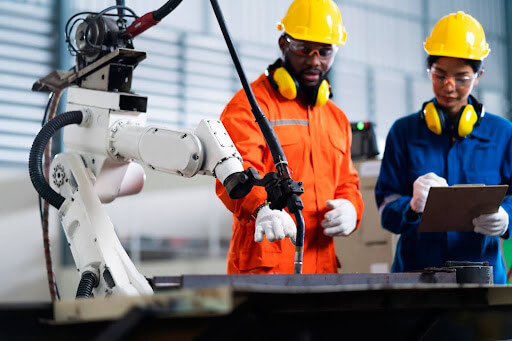 1-800-805-5783
1-800-805-5783 
The manufacturing sector is no stranger to technological revolutions. From the steam engine and assembly line to industrial robots and IoT-powered factories, innovation has continuously reshaped how products are designed, built, and delivered. Today, as we stand on the brink of a new era, Agentic AI in manufacturing is poised to become the next major leap in industrial automation, transforming factories into dynamic, intelligent, and adaptive ecosystems.
But what exactly is Agentic AI, and how is it redefining the manufacturing industry? Let’s explore Agentic AI in manufacturing.
To understand Agentic AI, it’s crucial to differentiate it from traditional AI and automation. Traditional automation, while powerful, primarily operates on pre-programmed rules and deterministic logic. A robot on an assembly line performs a specific task repeatedly, and any deviation requires human intervention or re-programming. Similarly, most AI applications in manufacturing today are designed to analyze data and provide insights, still requiring human decision-makers to act upon those insights.
Agentic AI, on the other hand, refers to intelligent systems designed to function autonomously, reason, set goals, adapt to changing circumstances, and execute multi-step tasks independently, with minimal human oversight. These “agents” are equipped with the ability to:
This means that instead of simply following instructions, an Agentic AI system can understand a desired outcome and then dynamically determine the best way to achieve it, even in unforeseen situations. This leap from automated assistance to orchestrated autonomy is what truly defines Agentic AI in the manufacturing context.
Before diving deeper into Agentic AI’s role, it’s essential to understand how AI has evolved in manufacturing:
This shift represents a transition from human-programmed automation to AI-driven autonomy.

The implications of Agentic AI in manufacturing are profound, promising a new level of efficiency, resilience, and innovation:
Agentic AI can optimize complex workflows and automate decision-making processes at speeds and scales impossible for humans. For instance:
Maintaining high product quality is paramount. Agentic AI can revolutionize quality control through the following:
Unplanned downtime due to equipment failure is a significant cost in manufacturing. Agentic AI transforms maintenance from reactive to proactive:
Agentic AI brings unprecedented visibility and resilience to complex supply chains:
Far from replacing human workers entirely, Agentic AI fosters a new era of collaboration:
While the benefits are compelling, implementing Agentic AI in manufacturing is not without its hurdles:
Agentic AI thrives on vast amounts of high-quality, real-time data. Manufacturers require robust IoT infrastructure, data lakes, and seamless integration across disparate systems to feed these agents effectively. Data silos and inconsistent data quality can be significant bottlenecks to effective data management.
The autonomous nature of Agentic AI can introduce a degree of randomness or unpredictability compared to traditional, rule-based systems. Ensuring the reliability and consistent, desirable outcomes of autonomous actions requires extensive testing, validation, and continuous refinement through human feedback loops.
As AI agents gain access to sensitive operational data and control over physical systems, data privacy and cybersecurity become paramount. Safeguarding proprietary information and preventing malicious attacks on autonomous systems are critical concerns. Robust security protocols, data anonymization, and granular access controls are essential for secure Agentic AI in manufacturing

Understanding “why” an Agentic AI made a particular decision can be challenging, especially in complex scenarios. For critical business processes and regulatory compliance, manufacturers must implement explainable AI (XAI) methodologies to ensure the transparency and auditability of agent actions.
The shift to Agentic AI necessitates upskilling and reskilling the workforce. Employees will need new competencies in AI oversight, data analysis, and human-AI collaboration. Ethically, considerations around job displacement, algorithmic bias, accountability in autonomous decision-making, and maintaining human control over critical processes must be proactively addressed.
Agentic AI is a key enabler for Industry 5.0, which emphasizes a human-centric approach to industrial automation. While Industry 4.0 focuses on automation and data exchange, Industry 5.0 envisions a future where humans and machines work in synergy, with AI augmenting human creativity and problem-solving rather than simply replacing tasks.
The future of manufacturing with Agentic AI promises more innovative, more resilient, and sustainable factories. We can expect to see:
Leading companies like Siemens are already embracing the potential of Agentic AI. They are showcasing a vision where industrial AI agents work autonomously across design, planning, engineering, operations, and service, coordinated by generative AI co-pilot interfaces. This proactive ‘automating automation’ approach promises significant gains in industrial productivity, setting a benchmark for others to follow.
Agentic AI marks a fundamental shift in industrial automation, moving beyond pre-programmed tasks to intelligent, autonomous decision-making and adaptive execution. Its transformative potential in enhancing efficiency, quality, supply chain resilience, and human-robot collaboration is immense for Agentic AI in manufacturing. While challenges related to data, trust, and ethics must be carefully navigated, the proactive adoption of Agentic AI in manufacturing will be crucial for manufacturers looking to remain competitive and innovative in the dynamic global landscape. The next leap in industrial automation isn’t just about faster machines; it’s about building smarter, more responsive, and truly intelligent manufacturing ecosystems that will redefine the future of production.
Intelligent systems that perceive, reason, plan, and autonomously execute tasks with minimal human oversight in factories, learning and adapting over time. This is the essence of Agentic AI in manufacturing.
Traditional automation follows fixed rules; current AI gives insights. Agentic AI autonomously acts on its reasoning, adapting to achieve goals, not just following instructions.
Agentic AI agents can optimize energy consumption, reduce material waste, and schedule processes during off-peak grid times. By continuously adjusting operations for efficiency, Agentic AI supports greener, more sustainable manufacturing practices.
Yes! Leading manufacturers like Siemens, Tesla, and Foxconn are experimenting with or deploying forms of Agentic AI. They use AI agents for dynamic scheduling, supply chain coordination, predictive maintenance, and adaptive quality control. While still emerging, Agentic AI is transitioning from pilot programs to broader adoption.
At [x]cube LABS, we craft intelligent AI agents that seamlessly integrate with your systems, enhancing efficiency and innovation:
Integrate our Agentic AI solutions to automate tasks, derive actionable insights, and deliver superior customer experiences effortlessly within your existing workflows.
For more information and to schedule a FREE demo, check out all our ready-to-deploy agents here.